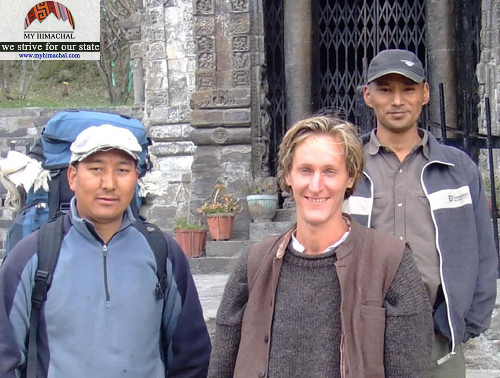
Biolaya Organics, Jagriti, SGS India, G.B. Pant Institute of Himalayan Environment and Development and the University of West of England joined forces to provide a sustainable income to remote villages of Himachal Pradesh, through the collection of Himalayan oregano. The distilled oil has strong market potential, having proven to be a potent anti-bacterial agent, including against MRSA, a well-known antibiotic-resistant bacterium. The the essential oil from the oregano kills MRSA at a dilution 1 to 1,000.
The SEED Initiative is an international programme backed by the UN that promotes and supports entrepreneurial partnerships that develop innovative, locally led solutions to the global challenges of sustainable development. The SEED awards provide backing to projects that are in an early stage of development and have high potential for growth and replication. The Himalayan Oregano project was one of five winners selected from over 400 global applications.
Disappointed by the recent publicity in the media Ben says that they have failed to convey the fact that this is primarily a conservation initiative aimed at providing sustainable livelihoods to herb collectors.
Let’s know more about the project in his own words.
Disha Singh: How does it feel to win SEED award? Please throw some light over the achievement.
Ben Heron: We are delighted to have won a SEED award! It is a huge opportunity for us , over the next year the SEED initiative will provide us with support in the form of training, market research, publicity and general backing to take the concept forward. Without this support it would be a very ambitious project, but we really feel that the objectives we have set ourselves are now really achievable.
Disha Singh: When and how did the Oregano oil project started?
Ben Heron: The oregano oil project is part of a broader initiative to conserve endangered species of medicinal plants and develop sustainable livelihoods in Himachal Pradesh. We started researching wild oregano in 2006 after indentifying it as a species that has potential for sustainable collection; the fact that its essential oil has value as an antimicrobial agent is something that we only came to learn about later while researching options for value addition.
Many herb collectors are dependent on the collection of endangered species for their livelihoods. Oregano is just one of many non-timber forest products that has the potential to provide the collectors with an alternative source of income. This can only happen though if appropriate value addition and market linkages are made so that a fair share of the profits can be paid to the collectors.
Disha: How did Biolaya Organics, Jagriti, SGS India, G.B. Pant Institute of Himalayan Environment and Development and the University of West of England get together to bring out the Oregano Oil Project? Please throw light over their area of contribution to the research?
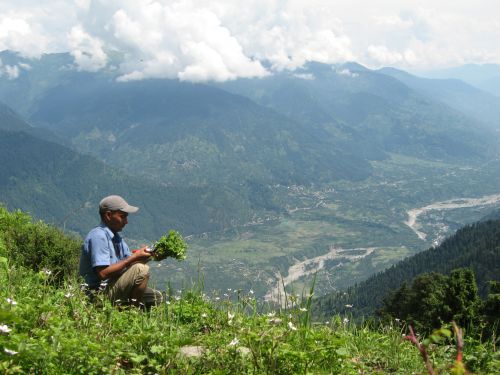
Jagriti is a community-based organisation based in Kullu working on sustainable livelihoods and women’s empowerment in remote parts of the district. Jagriti will be working with their village groups to develop a small community enterprise to produce oregano oil. Their distillation unit will be run by group members and will also be used to produce essential oils for use in their handmade soap enterprise.
Biolaya Organics is a small fair trade company based in Dashal Village in Kullu working on sustainable production and conservation of medicinal herbs. Biolaya is the main coordinator of the project, developing systems for sustainable collection and distillation, quality assurance and traceability, and is creating links with companies to market the oregano oil and produce a final product.
The G.B. Pant Institute of Himalayan Environment and Development is an autonomous Institute of the Ministry of Environment and Forests working in conservation of natural resources and ensuring environmentally sound development in the Indian Himalayan Region. The GBPIHED Himachal Unit will be conducting studies to assess and monitor sustainable collection methods, and carrying out trials to calculate the economics of cultivating oregano for essential oil production.
SGS India is a regional unit of the global inspection, verification, testing and certification company, SGS Group. Microbiologist at SGS are carrying out research into the antimicrobial properties of oregano oil, testing its efficacy against different types of bacteria and fungi, and comparing it against a wide range of conventional anti-bacterial products. SGS conduct routine tests to assess the carvacrol content of the oregano oil.
The University of the West of England are using state of the art technology to affirm SGS’s results and conduct further tests to assess the efficacy and uses of potential end products. UWE will be working with SGS to publish a paper in a scientific journal. UWE’s Research, Business and Innovation department is conducting market research to assess which products the oil could be used in and which companies may be interested to develop these products and create direct links with the producers.
In this way the partnership creates a direct link between the primary producers and the final product by developing a transparent chain of research, value addition and market linkages. We hope that this partnership will create a model that can be replicated with other herb species, whereby resources that can be sustainably managed are utilised in a way that directly benefit the communities as well as those who will be using the final products.
Disha: What are the special features of oregano oil? Is it useful in any other purpose than killing MRSA?
Ben: On the internet there are many claims regarding the uses of Mediterranean oregano oil. People say it can be used to treat indigestion, diarrhea, nervous tension, insect bites, toothache, earache, rheumatism and much more. Whether or not this is true we cannot say there are a lot of such claims on the internet! Very little research has been done on the Himalayan wild oregano, so all we can say with conviction is that it is very effective at killing bacteria and fungus.
Disha: What is Oregano called in local language?
Ben: We have asked many people in different areas of Kullu what oregano is called in the local language and most of them tell us that it has no name as they call it as bekaar ghaas. We have heard from some people in Seraj however that it is called maalza, and in the Lag Valley we were told that it is called chumbar. In Uttaranchal it is called bantulsi as this can be misleading though as there are a number of other species in India that are also called bantulsi.
Disha: Can it be grown in the farms by the farmers? If yes, how?
Ben: Yes oregano can be cultivated, but we do not know yet whether it will be profitable, nor do we know what effect cultivation will have on the anti-bacterial properties of the essential oil. These are all areas of research that the G.B. Pant Institute will be looking at in the next couple of years.
Disha: Will it be possible to see oregano oil being used in bathing soaps in near future? Is oregano oil safe on human skin?
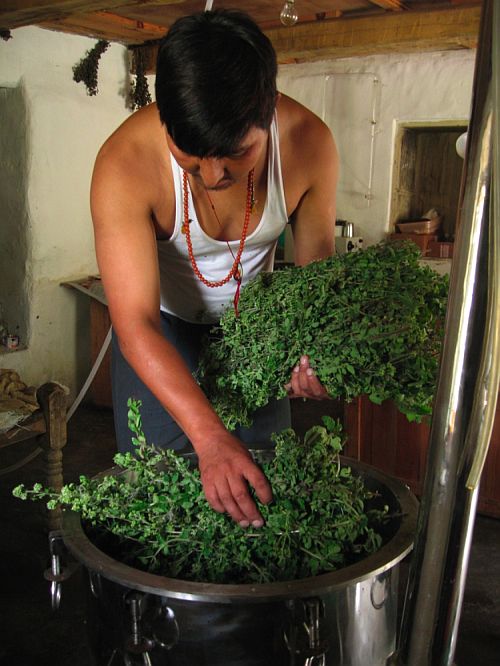
The University of the West of England is carrying out research to assess whether or not the oregano oil is safe to use on human skin. Used undiluted on open wounds the oil burns like chilli. UWE’s research will assess at what dilutions it needs to be used.
Disha: What are the dark sides of oregano?
Ben: None as far as I’m aware!
Disha: “Our aim is to be able to pay the local herb collectors the equivalent amount that they would normally earn from collecting endangered medicinal herb species so that they become less dependent on the extraction of these plants for their livelihoods.” What are your plans to implement these words?
Ben: This is our objective; to what extent will be able to meet this aim will become clearer over time. We are conducting surveys in the villages in Kullu district to assess how much people are earning from the collection of endangered herbs. At the same time we are also carrying out studies to assess the cost-benefits of oregano collection and how much companies can afford to pay for the oil.
We are exploring the possibility of applying for FairWild certification, which is a combination of FairTrade standards and the International Standards for Sustainable Collection of medicinal plants. Through this certification scheme there is an obligation for complete transparency between all the companies involved to ensure a fair price is paid to the collectors.
Disha: When do you plan to start plucking and collecting the oregano herb?
Ben: We have already been carrying trials for the last two years. In 2007 we collected small quantities from different locations at different times of the year so that SGS could do laboratory tests to assess its efficacy as an antimicrobial. In 2008 we started identifying collectors who have traditional rights in the areas in which oregano is growing, providing them with training and organising a few days collection in each location. We plan to organise a larger collection in 2009.
Disha: Are there any measures taken by you people to save the herb from being exploited by the materialistic minds of the people?
Ben: There is a lot of oregano growing in other parts of the world that are likely to keep the prices of the oregano oil very competitive, so at the moment there is no guarantee that this is going to earn us or anyone else much profit. If it does turn out to be profitable then it is inevitable that it will attract the attention of traders who have less concern for the environment. If this is the case then I believe the most important thing to do is educate the local right-holders about sustainable collection methods and encourage them to protect their own resources. Ultimately it is in their interest and the interest of their children to conserve their natural resource base. If a large demand is created then we will encourage cultivation of oregano in people’s high altitude fields.
Disha: What problems have you faced during the research?
Ben: One of the only problems up until now is from recent publicity in the media, which has failed to convey the fact that this is primarily a conservation initiative aimed at providing sustainable livelihoods to herb collectors. Much of the press attention has focused on the research we have been doing with MRSA, giving the impression that this is a project led by laboratory researchers, whereas in fact this is very much a grassroots initiative set up by locals from Himachal.
Disha: Finally, few words to our readers and to those who would like to help you guys in your project in any shape?
Ben: Once the enterprise is successfully up and running we will also be looking for other partners to replicate the project in other part of Himachal Pradesh where wild oregano is growing and if you are interested in getting involved, please let us know.
Ben Heron is based in the Kullu Valley since 2000 and has worked on a number of projects related to conservation and sustainability, first with the Ananda Society, then with Sehyog Research Group, and now Biolaya Organics.
Raised in Shimla and originally from Mandi district, Disha wears many caps which includes being part of a lead team of a fast growing IT company based out of Chandigarh. Earlier Disha was associated with My Himachal and visits Shimla regularly.




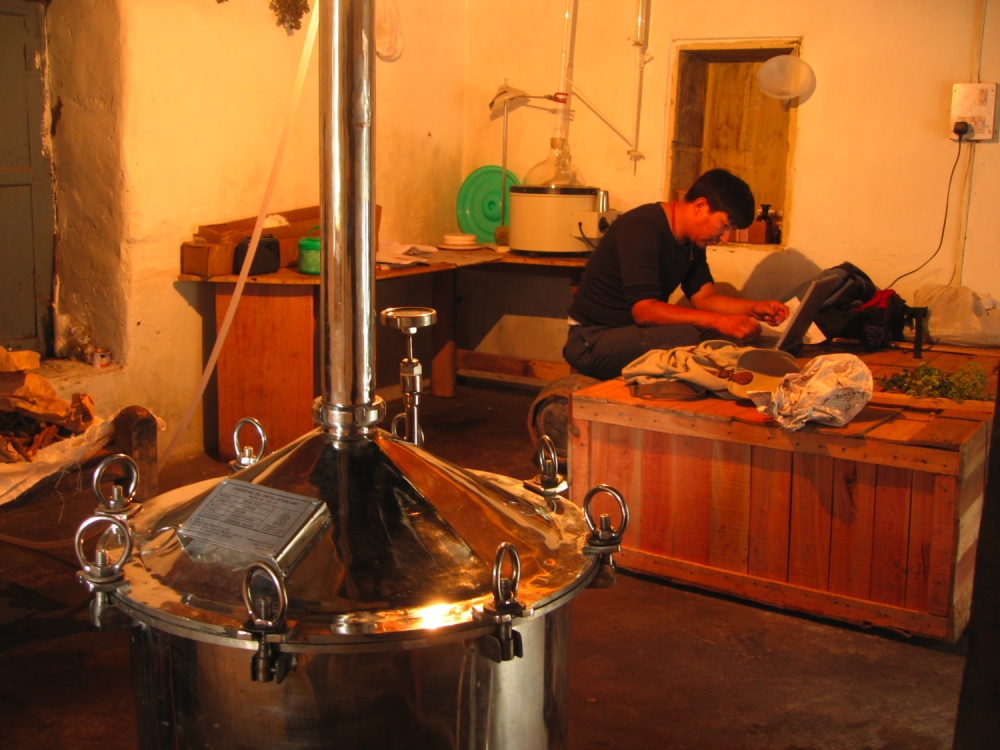
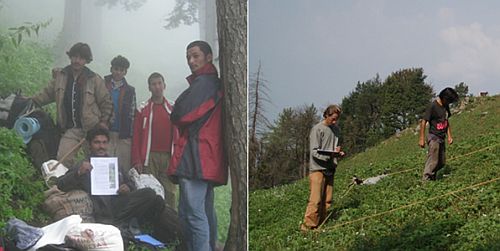
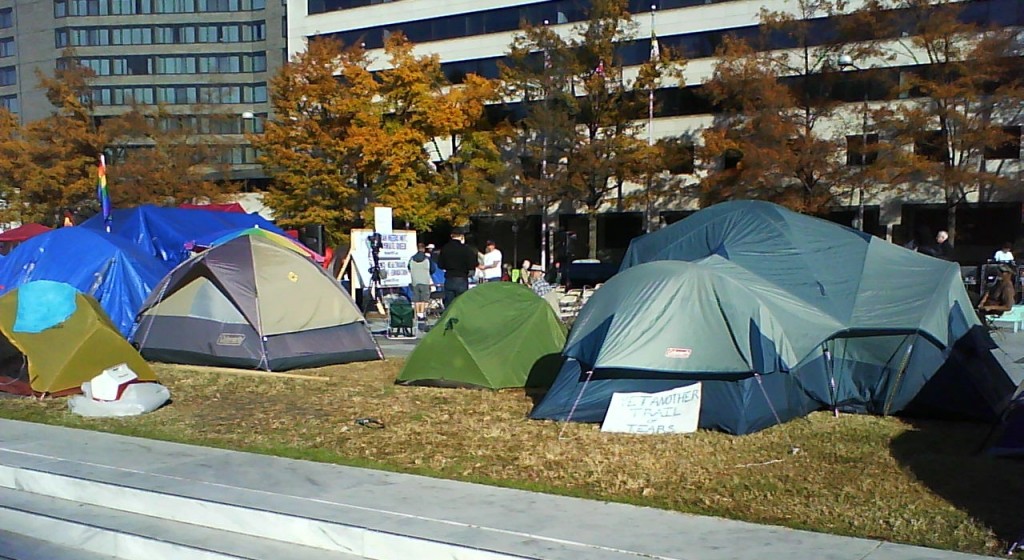
Great job Ben. Keep the good work up. I am sure the locals will benefit from these initiatives to a greater extent. Thanks for bringing the interview for us Disha.
Excellent report. Gives clear idea about the plant and at the same time shows the dedication and level of commitment by Ben and his team. I think the important part here to notice is the professional approach taken by Ben and others involved. For sure a great future ahead.
Good work Disha. It’s appreciable that Ben and his team are working on such projects instead of the wrong media publicity. The i/v gives a clear insight into the process which is necessary to understand the importance of the same…
Ben and his team are very meticulous in their approach to participatory research. I know Ben from my Great Himalayan National Park days when he helped in establishing medicinal plant nurseries. He also undertook preliminary research to know the growth of various herbs. He has been keeping and sharing record of various species which is very useful to understand if medicinal plants can genuinely contribute to the livelihoods of local people.
Ben’s current work with oregano essential oil is of great use to science. He is a person with rare dedication, focus and professional approach. His oregano oil research is an accomplishment of helping to protect vital western Himalayan ecosystems.
Congratulations, Ben. You and associate institutions deserve this award so very immensely.
Best,
Sanjeeva Pandey
Thank you friends, for appreciating my effort.
It had been a great pleasure for me to interview Ben and get detailed knowledge about his projects for you.
Waiting to use oregano based soap now ;-D
Hats off to Ben / Jagriti for this amazing feat. “Jangli Ghas” as this wild oregano is called in our local language can lead to a great alternative non timber forest product. However implementation on the grassroots level should be sustainable so that like so many other medicinal herbs that the Hidden Himalayas have to offer this does not disappear.
Ben recently undertook a seven day ” Jatamansi Trek ” with top CEO’s of Ayurvedic firms of the UK and the US in the Great Himalayan National Park organized by Sunshine Himalayan Adventures. One of the highlights was the training that the guides/ porters and tour organizers received during the course of the trek on the flora of GHNP which is immensely rich. We are planning to launch specialized medicinal herb treks giving more depth into our ecotours with such efforts.
We should keep the ordinary folks of Himachal in mind while advocating this project who would make this amazing feat possible. Hopefully by proper training and sustainable harvesting practices we could make this a great resource for the future.
Thanks Ben for the excellent work in favour of kullu valley (SHOBLA KAAM)
OREGANO project will help in diverting people mind from the endangerd herbs to these ordinary(vey valuble)and easily available herb.
Best of luck for your greatt work
kullu guys are with you
thanks
panki
ned the e mail of ben
old friendof his
i have a new grandson called ben
I have been looking on the Net for additional information and updates but I have not found any information written on this topic since 2009. Although it is a noble thought to help others create a thriving business plan using herbs, how many people are going to die form MRSA while we wait? I know of at least one, my aunt who is in long term care. She has contracted MRSA while living in an assisted living facility. The ‘Himalayan Oregano’ looks very similar to images of Marjoram I have seen on the Net. Things I’d like to know are; are these the same plants? Is regular oregano essential oil ok to use against MRSA, just in higher doses? Please let’s not make the rest of the world suffer and die waiting for answers to a stoppable disease.